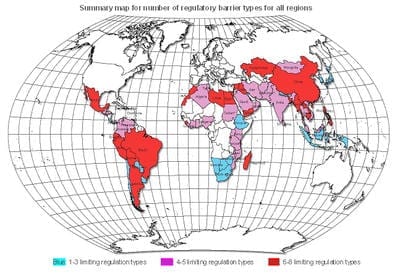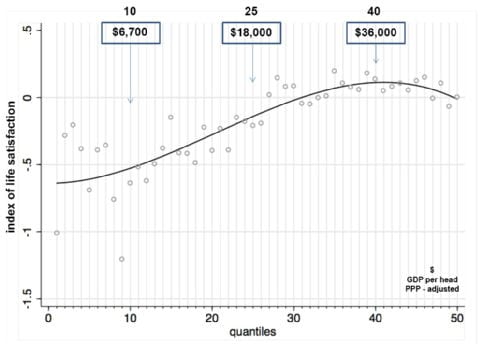
New global study led by ESMO reveals a pandemic of intolerable pain affecting billions, caused by over-regulation of pain medicines
A ground-breaking international collaborative survey, published today in Annals of Oncology, shows that more than half of the world’s population live in countries where regulations that aim to stem drug misuse leave cancer patients without access to opioid medicines for managing cancer pain.
The results from the Global Opioid Policy Initiative (GOPI) project show that more than 4 billion people live in countries where regulations leave cancer patients suffering excruciating pain. National governments must take urgent action to improve access to these medicines, says the European Society for Medical Oncology, leader of a group of 22 partners that have launched the first global survey to evaluate the availability and accessibility of opioids for cancer pain management.
“The GOPI study has uncovered a pandemic of over-regulation in much of the developing world that is making it catastrophically difficult to provide basic medication to relieve strong cancer pain,” says Nathan Cherny, Chair of the ESMO Palliative Care Working Group and lead author of the report, from Shaare Zedek Medical Center, Jerusalem, Israel. “Most of the world’s population lacks the necessary access to opioids for cancer pain management and palliative care, as well as acute, post-operative, obstetric and chronic pain.”
“When one considers that effective treatments are cheap and available, untreated cancer pain and its horrendous consequences for patients and their families is a scandal of global proportions,” Cherny says.
The study conducted in Africa, Asia, Latin America & the Caribbean and the Middle East assessed the availability of the seven opioid medications considered to be essential for the relief of cancer pain by the WHO Model List of Essential Medicines and the International Association for Hospice and Palliative Care. Those essential medications include codeine, oral oxycodone, transdermal fentanyl, immediate and slow release oral morphine, as well as injectable morphine, and oral methadone.
While there are problems with the supply of these medicines in many countries, the main problem is over-regulation that makes it difficult for healthcare professionals to prescribe and administer them for legitimate medical use, the authors say.
“This is a tragedy born out of good intentions,” says Cherny. “When opioids are over-regulated, the precautionary measures to prevent abuse and diversion are excessive and impair the ability of healthcare systems to relieve real suffering. The GOPI study has uncovered over-regulation in much of the developing world.”
“The next step is for international and local organisations working alongside governments and regulators to thoughtfully address the problems,” adds study co-author James Cleary, Director of the Pain and Policy Studies Group and Founding Director of the Palliative Medicine at the UW Carbone Cancer Center, Madison, Wisconsin, USA.
“Regulatory reform must be partnered with education of healthcare providers in the safe and responsible use of opioid medication, education of the public to destigmatize opioid analgesics and improved infrastructure for supply and distribution,” he says.
The Latest Google Headlines on:
Cancer Pain
[google_news title=”” keyword=”Cancer Pain” num_posts=”10″ blurb_length=”0″ show_thumb=”left”]
The Latest Bing News on:
Cancer Pain
- 8 Pancreatic Cancer Symptoms You’ve Probably Been Ignoringon May 8, 2024 at 10:26 am
A pancreatic cancer diagnosis is almost always serious, but symptoms often aren’t noticeable until the disease is in the advanced stages. Talk to your doctor if you spot any of these warning signs.
- 'Everything Hinges on Kate Middleton's Well-Being' for Prince William as He Carries Family's Pain (Exclusive)on May 8, 2024 at 5:00 am
As Prince William balances family matters with an elevated leadership role in the monarchy due to King Charles and Kate Middleton's cancer diagnoses, but his priority remains on supporting his wife.
- Cancer Pain Guidelines evaluation stresses on safe opioid practice and patient feedback systems, claims studyon May 5, 2024 at 7:59 am
Cancer pain is the most distressing symptom in a patient's life, with fear of unrelieved pain sometimes exceeding the patient's fear of death.Recently published research paper evaluates the ...
- Daniel Do wants to develop better cancer pain management strategieson May 3, 2024 at 2:35 am
MassLive is highlighting Asian American and Pacific Islander leaders across the state. Daniel Do a student at Harvard Medical School.
- Tramadol in the Treatment of Neuropathic Cancer Painon May 1, 2024 at 5:00 pm
a difficult to control pain. Cancer-related neuropathic pain is a heterogeneous syndrome that cannot be explained by a single aetiology, mechanism or anatomical lesion. One of the strengths of the ...
- Update in Cancer Painon April 17, 2024 at 5:00 pm
The WHO in 1986 established a stepladder approach for the treatment of patients with cancer pain. Clearly, the WHO method has been of enormous benefit for the treatment of cancer pain worldwide.
- Virtual Reality Therapy Helps Decrease Cancer Pain, Study Findson April 10, 2024 at 5:00 pm
A new study has used virtual reality (VR) to help reduce cancer pain for hospitalized patients, potentially providing a non-invasive and non-pharmacologic approach to improve the quality of life for ...
- How Virtual Reality Might Ease Cancer Painon April 8, 2024 at 7:58 am
A short virtual reality session significantly lessened pain in patients with cancer, a new study has found. Most people with cancer experience pain and treatment usually involves pain-relieving ...
- Doctors Dismissed My Pelvic Pain for Years — Until I Was Diagnosed With Ovarian Canceron April 7, 2024 at 5:00 pm
Understand what causes ovarian cancer pain, what ovarian cancer pain feels like, and what you can do to help manage your pain. Hairdressers, beauticians, and accountants may have an increased risk ...
- Identical twin of teenager with rare form of cancer says she gets the same pain as her sister - but is completely healthyon April 5, 2024 at 8:21 am
Sophie Walker, 17, was diagnosed with Wilms tumour, a type of kidney cancer, in October 2017. Strangely, her twin sister, Megan, also suffered from similar symptoms - including back pain in the ...
The Latest Google Headlines on:
Untreated Cancer Pain
[google_news title=”” keyword=”Untreated Cancer Pain” num_posts=”10″ blurb_length=”0″ show_thumb=”left”]
The Latest Bing News on:
Untreated Cancer Pain
- State’s 1st robotic nipple sparing mastectomyon May 8, 2024 at 5:38 pm
and 52-year-old Aarthi Sekhara (name changed), who was diagnosed with breast cancer a year ago and had multiple cancerous lumps in all the quadrants of her right breast. Both patients are now ...
- Beloved Coach, 60, Dies of Cancer After Chemo Drug Halted amid Nationwide Shortage: 'It Was Horrible'on May 6, 2024 at 6:08 am
Jeff Bolle, 60, died of cancer seven months after losing access to his chemotherapy drug amid the nationwide drug shortage.
- Stomach cancer – symptoms, causes and treatmenton May 2, 2024 at 5:00 am
Catching this aggressive disease early is key to avoiding a poor prognosis. Here are the signs to watch out for ...
- King Charles' health history revealed, from his cancer battle and broken rib to his 'sausage fingers'on April 26, 2024 at 10:01 am
Doctors, however, discovered an unspecified form of cancer after tests in February ... But the wound failed to heal properly and after three months of pain - and a warning that, untreated, it could ...
- What Are the Complications of Untreated Crohn’s Disease?on April 25, 2024 at 5:00 pm
Colon cancer is very treatable if it ... It can lead to symptoms such as severe abdominal pain, diarrhea, fever, and fatigue. If left untreated, Crohn’s can lead to serious health complications ...
- Knowledge of and Barriers to Pain Management in Caregivers of Cancer Patients Receiving Homecareon April 23, 2024 at 5:00 pm
Cancer pain needs to be taken seriously. If left untreated, cancer pain can affect every aspect of life--the ability to work, to interact with other people, and to cope with illness. Studies have ...
- Professional Faqs: What Happens If I Leave My Ibs Untreated?on April 22, 2024 at 9:50 pm
It does not cause colon cancer or IBD ... Leaving IBS untreated will promote the persistence of its symptoms. This will result to pain and discomfort. What are people curious about?
- Signs and Symptoms of Endometrial Canceron April 7, 2024 at 5:00 pm
Later symptoms may include pelvic pain and bloating ... due to their abnormal vaginal bleeding. But when left untreated, endometrial cancer may start to spread through the wall of the uterus ...
- Signs Your Painful Urination Is Actually Canceron April 7, 2024 at 4:38 am
Hematuria, back pain, frequent urination, and painful urination are all potential signs of bladder cancer. Here's what ... you don't want to leave it untreated. According to a 2016 systematic ...
- Cystic Neoplasms of the Pancreason March 14, 2024 at 12:06 pm
Most symptomatic patients have mild upper abdominal pain, epigastric fullness ... Current thinking is that all of these tumors will eventually evolve into cancer if left untreated. Malignant ...










